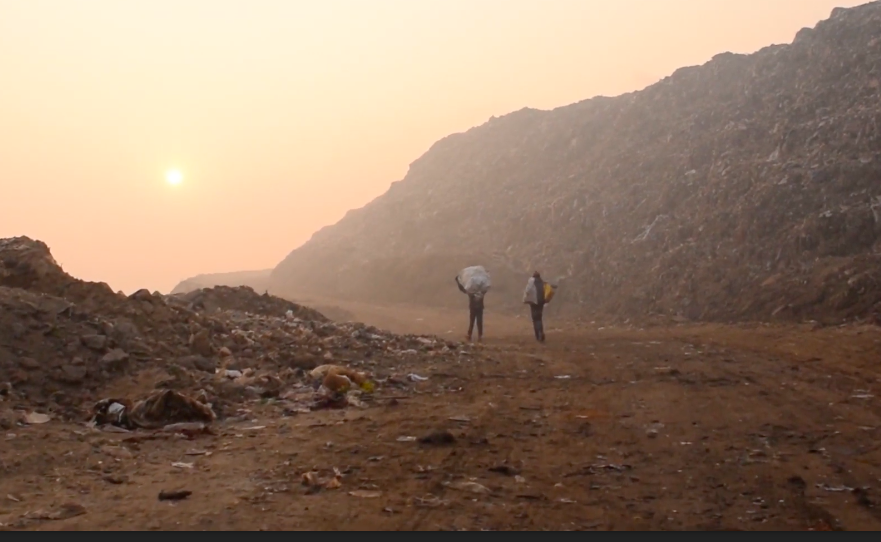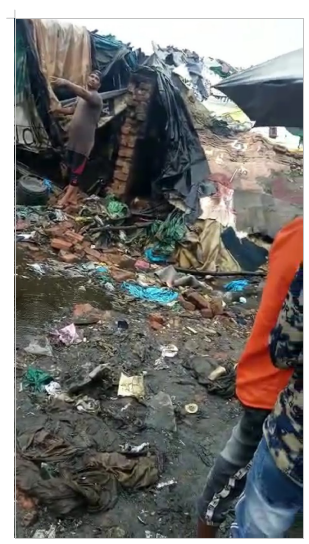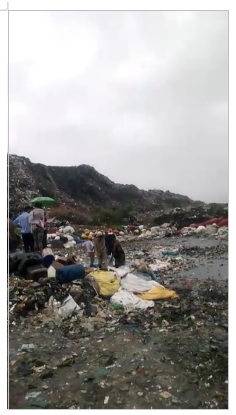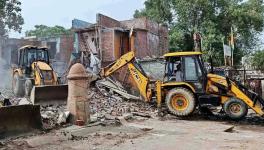Several Houses Destroyed as Trash from Landfills Spill in North West Delhi’s Bhalswa

The national capital has witnessed intermittent heavy rainfall over the past two days. As many across the city relish the rains, the houses of hundreds of people, located near the 40 m tall mountain of garbage in North West Delhi’s Bhalswa, are under threat.
Yesterday (August 13), a major chunk of the garbage dump, the peak of which is more than half the size of the Qutub Minar, came down heavily leading to the collapse of over 15 houses and gravely injuring one person and trapping a child who was later rescued from the garbage. The injured person has reportedly died.
Speaking to NewsClick, Akbar, a resident of the area who was present there, said, “At 8:30 in the morning a small pile of garbage broke down from the tall mountain of garbage. On hearing this, the panicked residents vacated their houses, they barely had five minutes to do this as minutes later a bigger chunk of garbage fell right through leading to enormous damage.”
“We were staring at death,” said another resident. Rabiya, whose house was among those that collapsed under the pile, told NewsClick, “We saw one boy getting trapped completely under the load of trash, we somehow managed to pull him out. Another small child was trapped too and one of the boys from my lane has been admitted to the hospital and is struggling to survive.” Rabiya, like many others living in the community, is a ragpicker making a living out of the enormous mountain of solid waste. “This trash which is my livelihood is the biggest cause of our destruction, it's polluting our water, poisoning our homes,” she said.


‘Scrambling for food, no clothes on our back’
Another resident Ramesh said, “The trash has flooded our houses. Only we are alive, we have nothing else left. We have to borrow clothes to put on our backs now. There is no MLA or anyone from the administration who has come to help us. Six of us who were living together were earning our livelihood from this trash dump. But, now I will have to start from scratch, everything is lost.”
Delhi produces 90,00,000 kg of garbage a day. A significant amount of this waste finds its way to one of the city’s four landfill sites—Ghazipur, Okhla, Bhalswa and Narela-Bawana. As it currently stands, three of the four landfill sites operate beyond capacity.
Also read: Okhla Residents Protest Expansion of Jindal Plant, Call Public Hearing Anti-Resident
A recent World Bank study had revealed that India is the world’s highest waste-generating nation. This waste is collected, segregated and further cleaned by communities who live under this mountain of garbage-- residents like Ramesh and Rabiya.
Waste accumulation-- a policy failure
The 88 lakh metric tonnes of garbage collected in Bhalswa has accumulated over the past 26 years. While the deadline for eliminating this garbage is nearing soon in October this year, progress is nowhere in sight even after garbage sorting machines working for a year to reduce the mountain of garbage. During the year of work, this landfill site's 60-metre high garbage mountain has reduced by just 15 metres.
The landfill commissioned in 1994 was supposed to be closed in 2010 when it reached about 22m in height and had about 8 million tonnes of accumulated waste. However, bulldozers keep levelling the garbage while trucks continuously dump waste.
Following this, the Compliance of Municipal Solid Waste Management Rules, 2016, were targeted towards enabling the waste to be eradicated and directions were issued for creating buffer zones around the plants and landfill sites. Further directions were to comply with the various other provisions of the 2016 rules. The rules advised that the biodegradable waste should be processed, treated and disposed of through composting or bio-methanation within the premises as far as possible and the residual waste shall be given to the waste collectors or agency as directed by the local authority.
Commenting on this, environmental lawyer practising at the National Green Tribunal, Rahul Choudhary told NewsClick, “This is the worst managed aspect of solid waste, even though its the easily manageable one. This is a policy failure as for the longest time we have had solid waste management rules. They were were amended in 2016 and complete details have been given. However, most places in Ghazipur and Bhalswa remain the worst managed sites as the waste from the landfills continues to pollute groundwater and poison the air. It could have been completely managed by now. The corporations are not following suit and not complying with the guidelines by dumping garbage at riverbanks or by not segregating the waste at source leading to the mountain of trash crisis.”
According to a report in the India Water Portal, instead of cleaning out the landfills, the corporations are attempting to create ‘energy out of waste’ by tapping the landfill gases to be sold to businesses and municipalities. “These alternative waste treatment processes, recognised as toxic activities as per the Kyoto Protocol, are being pushed through under the pretext of ‘reducing’ methane emissions. The landfills are sitting on disasters such as the one witnessed in Bhalswa and are proving to be a ticking time bomb as the race to come up with innovative solutions to clean our cities remain consigned to oblivion by policymakers and the municipal corporations,” it said.
Get the latest reports & analysis with people's perspective on Protests, movements & deep analytical videos, discussions of the current affairs in your Telegram app. Subscribe to NewsClick's Telegram channel & get Real-Time updates on stories, as they get published on our website.
























